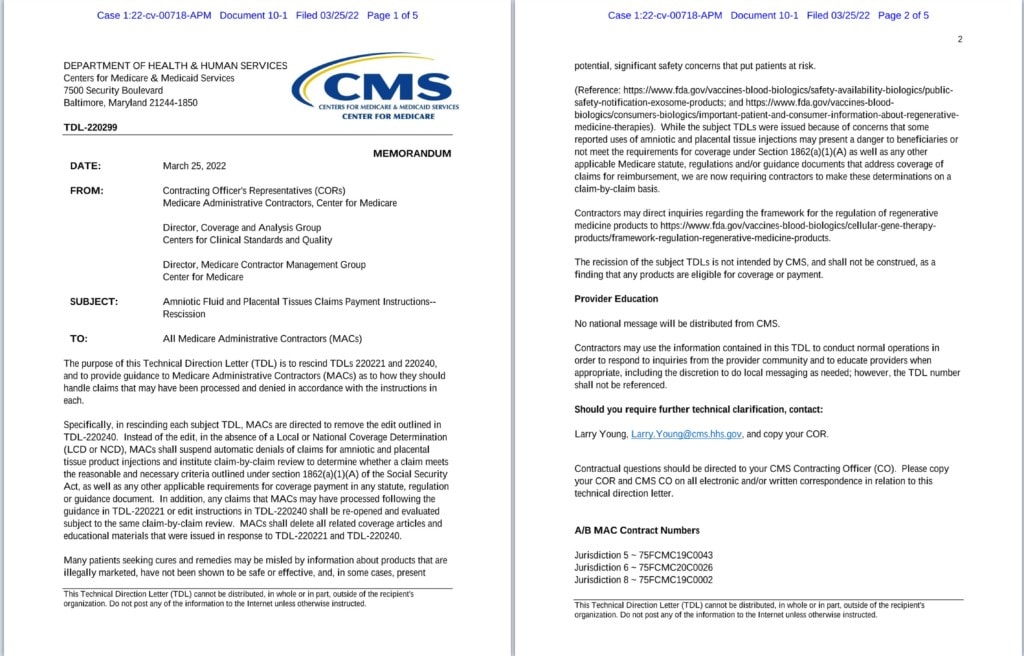Has Medicare Reversed Course on It’s Injectable Birth Tissues Clawback?

Credit: Shutterstock
As you may recall, Medicare recently announced a major clawback of payments made for injectable birth-tissue products. However, in a surprise move, a recent letter from CMS seems to rescind the prior clawback. What in the world is going on? Let’s dig in.
The Recent Medicare Clawback
Several years ago, multiple birth tissue vendors selling amniotic and umbilical cord tissues began targeting pain and orthopedic doctors claiming that they had received product reimbursement codes from Medicare. The sales reps claimed that this meant that you could inject these products to treat joint or spine pain and get reimbursed by Medicare. They then had physicians sign agreements to purchase those products at a discount and then instructed doctors to bill Medicare a higher amount. Why? So that the doctors could pocket the difference.
The problem? There were never any Medicare guidelines that covered injecting these products into joints or the spine. Despite that, Medicare paid about a third of a billion dollars on these claims. However, Medicare rules say that if the program pays you in error, you owe that money back once they discover that error. Hence, Medicare issued a birth tissue injection clawback going back more than two years, meaning that thousands of physicians owed lots of money back to the Feds.
Regen Labs Sues CMS
After a clawback was issued, one of the smaller players in this larger phenomenon called Regenative Labs sued the entire Medicare system including all regional administrators (MACs). Regenative’s argument was that Medicare seemed to classify its products as unapproved 351 drugs (when used to treat pain conditions) and thus were not eligible for reimbursement. Regenative asserted that this call can’t be made by CMS and could only be made by the FDA. Regenative also stated that it would go out of business if a federal judge didn’t issue an immediate injunction to stop the clawback.
After talking to an FDA legal expert, he didn’t feel that this position would hold water. All that needed to happen to destroy the argument was for FDA to issue a Warning letter to Regenative that its product is an unapproved drug. Since FDA has issued many of these letters already to vendors similar to Regenative, this seemed likely to happen.
AATB Gets Involved
AATB is the tissue banking industry organization that promulgates standards and site certification. They wrote a letter to CMS dated March 22nd, 2022.
In that communication, they correctly point out that the language of Medicare’s clawback was a bit funky in that for some inexplicable reason it focused on birth tissues but then added other language about exosomes. Suffice it to say that Medicare probably never should have waded into the exosome weeds. I think they likely went there because the 2019 FDA consumer warning they cited and used to backdate the clawback contained the term “exosomes”.
The AATB asserted that if Medicare were to use any date for the clawback that it should be the end of the FDA discretionary period which was May, 31st, 2021. AATB also commented that while Medicare may choose not to cover these products for injection going forward, it shouldn’t go backward and claw back money. However, I’m not sure this holds water as Medicare routinely claws back money it has already paid.
The New Medicare Rescission on this Clawback

Perhaps the most surprising thing in this bizarre mess is that as part of the Regen Labs case, CMS issued a March 25th, 2022 rescission letter, basically axing the huge clawback (see letter above). In that memo, Medicare said it would now review each of these claims on a case-by-case basis. So what does this mean?
I reached out to a Medicare insider who believes as I do that this means every one of these claims will now be denied one by one. Meaning this is a neat magic trick by CMS whereby they took the recent Regen Labs request for an injunction off the table by rendering that request moot. Now the case can proceed to what a legal expert I spoke with believes will be a Regen Labs loss at the government’s motion to dismiss.
In summary, Medicare either denies all of these injection claims now or does it one by one. Doing it one by one gives them more of an iron-clad defense against anybody claiming that this has to do with CMS pretending to be FDA. It also protects them from any criticism that they extended a blanket denial.
Should You Bill Medicare for These Products in 2022?
Getting in trouble with Medicare has many levels, a bit like Dante’s Inferno. The first is that you billed them in error because you’re a knucklehead. In that case, you just owe the money back. However, if there was “intent”, meaning you knew that what you were billing wasn’t covered and you billed it anyway, then there’s the next level down. At that level, you get a new orange jumpsuit and a nice stay in a federal minimum-security prison.
Given Medicare’s actions on these claims to date, it’s now harder to argue that there is no intent for someone billing these injections. In fact, my Medicare insider wanted everyone to know that providers should NOT take this rescission as an indication that you can bill Medicare for these products. In fact, she believes that this crosses dangerously close to that new orange jumpsuit. That’s doubly true if Medicare just denies these claims one by one.
What’s Next?
I wouldn’t be surprised if we see Regen Labs getting a visit and then a Warning or Untitled letter issued by FDA. It’s also my opinion that the judge on the Regen Labs case will throw out the suit at the government’s motion to dismiss. Why? Suing city hall is very tough.
The upshot? In my opinion, Medicare has now decided to deny these birth tissue injections one by one rather than in bulk. While that will be more time-consuming, I suspect the result will be the same. In the meantime, please stay away from billing these injectable products to Medicare as nobody looks good in orange!

NOTE: This blog post provides general information to help the reader better understand regenerative medicine, musculoskeletal health, and related subjects. All content provided in this blog, website, or any linked materials, including text, graphics, images, patient profiles, outcomes, and information, are not intended and should not be considered or used as a substitute for medical advice, diagnosis, or treatment. Please always consult with a professional and certified healthcare provider to discuss if a treatment is right for you.
